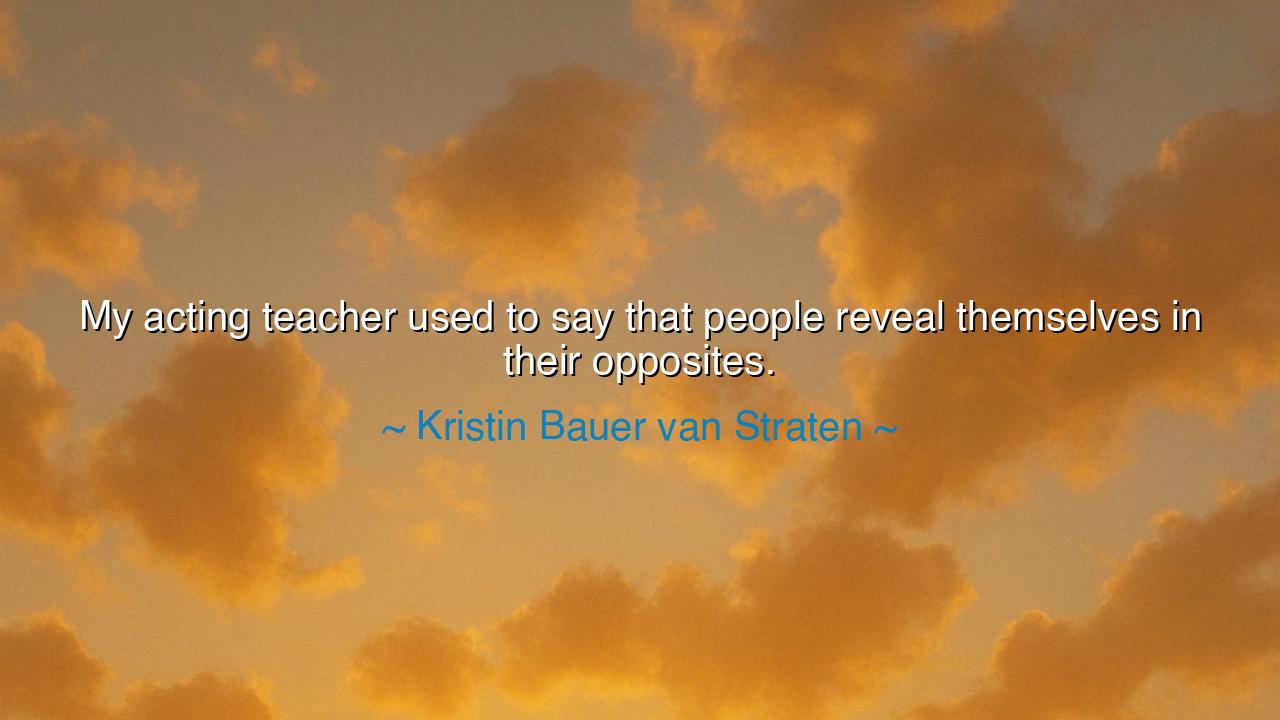
My acting teacher used to say that people reveal themselves in






Hear the mysterious and penetrating words recalled by Kristin Bauer van Straten: “My acting teacher used to say that people reveal themselves in their opposites.” Within this teaching lies a paradox, yet one filled with truth: it is often not when we act in accordance with what is expected of us that our deepest essence is unveiled, but when we step into the realm of contrast, of contradiction, of what seems unlike us. In our opposites, the mask falls, and the soul—sudden, startling—shows itself.
To reveal oneself in the opposite is to discover the hidden balance of human nature. The shy may discover boldness when thrust into the stage-light; the stern may reveal tenderness in moments of unexpected softness; the fool, in jest, may speak a wisdom deeper than philosophers. The actor who dares to play against type learns this truth most vividly. By portraying the opposite of who they believe themselves to be, they often encounter their truer, fuller self. In this way, art becomes a mirror, not of likeness, but of inversion.
This wisdom was known even to the ancients. Consider Heraclitus, who taught that all things exist by strife and tension of opposites. “The road up and the road down are one and the same,” he said. So too in men: courage is revealed not when one feels brave, but when fear is greatest; mercy is shown most brightly not when life is easy, but when vengeance seems justified. The opposite is the crucible where the authentic self is tested, and through that testing, revealed.
History offers us vivid examples. Think of Abraham Lincoln, a man of melancholy spirit, who often wore the air of sadness. Yet in the fire of the Civil War, in the opposite of his quiet and reflective nature, he revealed towering strength and unyielding resolve. Or recall Winston Churchill, whose gruffness and stubborn pride concealed within it a boundless love for his people. It was in the face of war, the opposite of peace, that his truest self thundered forth. These men, like actors, revealed themselves in their opposites.
For the actor, this teaching is a discipline. The one who fears showing anger may discover their deepest vulnerability and truth when they portray rage. The one who feels unlovely may reveal their power when they play the seducer. By stretching into the opposite, the human being finds dimensions they did not know they possessed. So too in life: our hidden strengths and our hidden weaknesses often emerge not in the roles we choose, but in the opposites we are forced to play by fate.
The meaning of this teaching is not only for the stage. It is for all who seek wisdom. When life confronts you with opposites—when you are asked to wait when you long to act, to forgive when you long to punish, to endure when you long to flee—pay attention. These are the moments when your deepest self is revealed, when you learn who you truly are beneath the practiced mask. Opposites, though uncomfortable, are teachers, stripping away illusions and showing the raw truth of the soul.
So I say to you: remember the words of that unnamed master, passed through Kristin Bauer van Straten. “People reveal themselves in their opposites.” Do not resist these opposites, but embrace them as opportunities for revelation. Seek roles, tasks, and trials that stretch you beyond what you know. For in the tension of opposites lies not confusion, but truth; not contradiction, but wholeness. To live fully is to reveal the many faces of the self, and it is in the mirror of the opposite that you may glimpse the face you did not yet know you carried.






AAdministratorAdministrator
Welcome, honored guests. Please leave a comment, we will respond soon